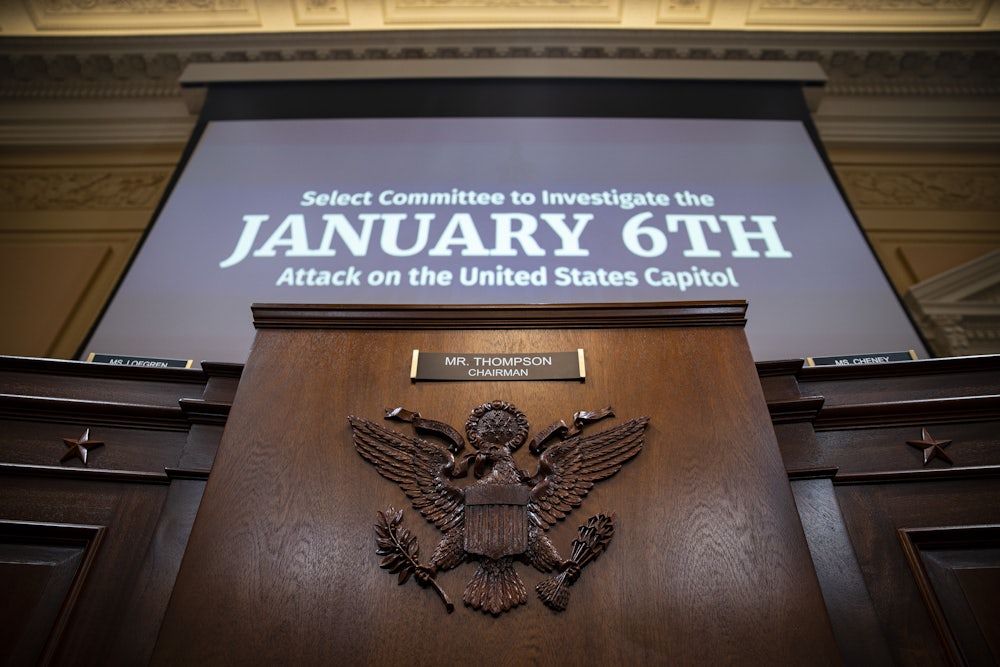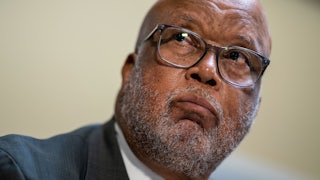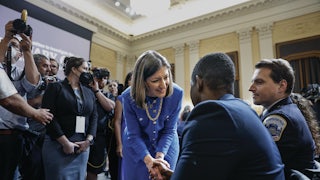As the House select committee investigating the attack on the Capitol on January 6, 2021, held its final meeting on Monday—the last before the incoming Republican House majority takes office and likely ends any further congressional investigations into the worst attack on Congress since the 1800s—the cable news–ready headline was the committee’s decision to refer several criminal complaints about former President Donald Trump to the Justice Department. While the referrals are largely symbolic, and the Justice Department is embarking on its own investigations into the insurrection, Monday’s meeting and the committee’s as-yet-unreleased report are intended to provide an evidential grounding demonstrating Trump’s culpability as the prime instigator for inciting the assault.
Buried deeper amid more than a year of exhaustive investigations, outlined by the committee in more than 160 pages of introductory material released on Monday, a picture emerges: Trump may have been the linchpin of the events of January 6, but the plot to overturn the democratic process was a group effort, featuring the head of the Republican National Committee, several prominent members of Congress, and a bevy of people influential in modern Republican politics. Trump may be the key actor and figurehead of the movement, but the strain of election denialism in the GOP goes much deeper than one man alone.
Ronna McDaniel
Trump’s efforts to disrupt the Electoral College with a slew of fake electors brought in top Republican officials. According to the report, in the early half of December, Trump held a teleconference with Republican National Committee Chair Ronna McDaniel and lawyer John Eastman in order to get them to help “prepare a series of false Trump electoral slates of seven states Biden actually won.” McDaniel agreed to help. But rank and file committee members weren’t totally on board, the committee found. The report says that multiple Republicans who were “persuaded to sign the fake certificates also testified that they felt misled or betrayed, and would not have done so had they known that the fake votes would be used on January 6th.” McDaniel, apparently, wasn’t one of them. The committee highlighted the false elector scheme that McDaniel took part in, stating based on her testimony that “sufficient evidence exists for a criminal referral of President Trump for illegally engaging in a conspiracy” to violate the law.
Ironically, as she runs for another term as chair of the RNC, McDaniel more recently wants some space from Trump. When she was asked if she would seek Trump’s support as she runs for RNC chair, she refused to answer.
Scott Perry
Scott Perry, a Republican representative from Pennsylvania, was an early subject of the committee’s investigation. Perry’s name comes up over 10 times in the final report. The committee suggests that the Justice Department seek (through grand jury subpoena “or otherwise”) communications between Perry, House Republican caucus leader and likely future House Speaker Kevin McCarthy, and others who are likely to be “materially relevant communications with Donald Trump or others in the White House.” Those lawmakers have refused to comply with subpoenas from the January 6 committee. In the weeks following the 2020 presidential election, Perry put together a set of unfounded allegations of voter fraud and sought to pass those on to the acting attorney general. The committee’s report is a pretty strong nudge to the Justice Department to further investigate Perry.
Jim Jordan
Another key player identified by the committee is Representative Jim Jordan, the incoming chair of the Judiciary Committee, a powerful conservative ally of McCarthy and a pugilistic defender of Trump. The committee highlighted a conference call convened by Jordan on January 2, 2021, in which he, the president, and other GOP members of Congress strategized about ways they could delay the counting of electoral votes. He spoke with Trump for 18 minutes later that day and had at least two phone calls with the president on January 6. The committee also found that Jordan spoke with White House staff about the prospect of obtaining presidential pardons for members of Congress on January 7. Jordan, who was one of McCarthy’s initial picks to serve on the select committee, also ignored a subpoena by the committee in June. (McCarthy withdrew his Republican picks for the committee after Speaker Nancy Pelosi threatened to pull Representatives Jordan and Jim Banks.)
Andy Biggs
Representative Andy Biggs was another conservative Republican who encouraged efforts to contest election results, the committee found. Biggs and Arizona state Representative Mark Finchem attempted to gather signatures appointing a false slate of electors to overturn Biden’s victory in the state. (Finchem unsuccessfully ran for Arizona secretary of state this year and has attempted to challenge his own election results.) Biggs has also defied a subpoena from the select committee.
Other GOP members of Congress
More than 100 House Republicans and several Senate Republicans voted to overturn the election results after Congress reconvened on January 6 after the mob of insurrectionists had been cleared from the building, but the select committee identified some GOP lawmakers as encouraging Trump’s efforts even before then. The offices of Representative Mike Kelly and Senator Ron Johnson were delivered fake slates of electors for Wisconsin, and Kelly’s and Johnson’s offices attempted to share those slates with former Vice President Mike Pence, but his aide refused to accept them. Trump also called Republican senators on January 6 during the riot, including Senator Tommy Tuberville, whom he reached through Senator Mike Lee. (The president’s attorney, Rudy Giuliani, also attempted to contact multiple senators on the evening of January 6.)
The committee has also been scathing in its criticism of McCarthy, whom the president’s son-in-law Jared Kushner described as “scared” on January 6. McCarthy pushed back against Trump on January 6 and the days thereafter, even suggesting privately that the president could resign. But in subsequent weeks, he repaired his relationship with Trump, and he has since earned the former president’s endorsement to be the next speaker of the House.
The final meeting of the committee, and its impending report, served as a sort of passing of the baton from the committee to other entities that could perhaps take concrete action—the Justice Department, certainly, but also the House Ethics Committee and the Senate. As Representative Jamie Raskin highlighted in Monday’s hearing, the select committee had already presented some of its evidence to a federal judge who had ruled in its favor in obtaining records from Eastman. That judge also concluded that Trump had participated in a “conspiracy to defraud” the United States. (The committee also referred Eastman, Giuliani, Jeffrey Clark, Kenneth Chesebro, and Mark Meadows to the Justice Department for potential prosecution.)
The select committee also referred McCarthy, Jordan, Perry, and Biggs to the Ethics Committee as part of its report, “only for failure to comply with lawfully issued subpoenas,” according to introductory material. (Biggs is currently challenging McCarthy for the speakership from the right.) As the Ethics Committee is evenly divided between the two parties, it’s impossible to imagine that the panel will take action against the representatives who were part of the effort to overturn the 2020 election.
When asked by The New Republic whether he believed the Ethics Committee would take action, Raskin replied, “I think that they will undertake a serious discussion and dialogue about it. And they should recall that what they do here will set a precedent going forward into the future.”
While the Senate is remaining in Democratic control, the extent to which it will continue to investigate the January 6 attack is still unclear. “We haven’t made any decisions as to what we’re going to be doing, but it’s part of a broad range of things that we’re considering,” Senator Gary Peters, the chair of the Senate Homeland Security Committee, told The New Republic earlier this month when asked if his committee would continue the work of the House Select Committee.
In his opening statement on Monday, Committee Chair Bennie Thompson highlighted the importance of accountability in preventing another such attack from occurring. “We have every confidence that the work of this committee will help provide a roadmap to justice, and that the agencies and institutions responsible for ensuring justice on the law will use the information being provided to aid in their work,” he said. Whether that “roadmap” is followed, however, now depends on the choices of Justice Department officials and lawmakers in both houses of Congress.






